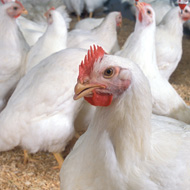
Study will look into behaviour and brain activity
The brain activity and behaviour of broiler breeder chickens is to be studied as part of research aims at improving their diet.
The diet of broiler breeder chickens has long been a welfare issue for those involved in poultry production.
They are the parents of chickens grown for their meat. Unlike their offspring who will be slaughtered at around six weeks, broiler breeders live much longer.
Their growth up to puberty (20 weeks) is important because if their access to food is not controlled, they might become obese, which can lead to serious health problems.
If, however, their diet becomes too restrictive, the birds are left feeling hungry.
Now Biotechnology and Biological Sciences Research Council (BBSRC) has awarded £400,000 for research to improve the diets of broiler breeder chickens and keep them feeling fuller for longer.
The study will be undertaken by a team from Scotland’s Rural College (SRUC), Newcastle University, The Roslin Institute and Biomathematics and Statistics Scotland (BioSS).
Dr Rick D’Eath, who will be leading the project at Scotland’s Rural College, said: “This research will assess how the chickens are affected by different types and amounts of food. We need to understand how best to rear them from chick to adult, keeping them healthy without over or under feeding them.
“The feeding of broiler breeder chickens is a welfare concern around the world. At the end of this three year project we hope to inform and influence future poultry industry guidance on feeding broiler breeders which could improve the welfare of millions of chickens around the world.”
Before puberty, birds are ration-fed, receiving between a quarter to a third of the food they would choose to eat if allowed to feed freely.
One solution is to add indigestible high fibre ingredients to their feed which can make the chickens feel more satisfied and should not result in excessive weight gain.
Researchers, however, say having a full gut is only one part of feeling hunger has been satisfied.
They will investigate the way in which different diets affect hunger signs in the brain, the gut and in the birds’ behaviour. This will then help them to better understand whether the birds genuinely feel less hungry when fed the newly designed diets.
The SRUC’s team will assess the behaviour aspect while The Roslin Institute and Newcastle University will provide expertise on brain and gut physiology, with advice and analysis provided by BioSS.



 The latest
The latest